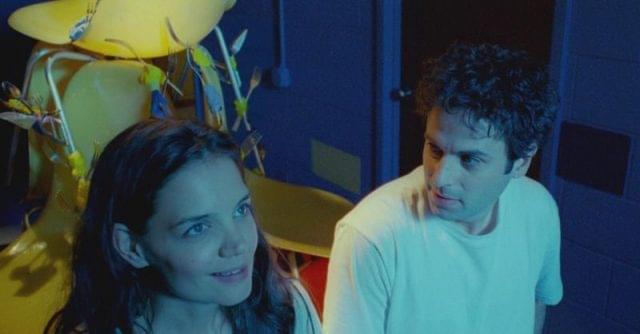
There is a book called “Touched with Fire” (subtitled “Manic-Depressive Illness and the Artistic Temperament”), but the movie “Touched with Fire” is not based on it. Rather, it’s writer-director Paul Dalio’s semi-autobiographical story about bipolar characters who are helped by the book, whose psychologist author, Kay Jamison, appears as herself to endorse its contents (oh boy).
Dalio takes us through a year in the lives of these characters, divided by season, starting with “Fall.” (Get it? Because this is when they fall.) Carla (Katie Holmes) and Marco (Luke Kirby) are twentysomething poets who are introduced to us separately. Carla is reading from her book of poetry (called “faded,” lower-case, in case “Fall” wasn’t enough of a clue) at a bookstore; Marco is holed up in his apartment, smoking weed, going “off the grid,” generally talking crazy.
Carla and Marco meet each other soon after this, in a psych ward, surrounded by a cuckoo’s nest of colorful characters — the perfect setting for a “meet-cute”! They tend to bring out each other’s manic sides, though, and have to be separated. Once released, they pursue a relationship, watched warily by Carla’s parents (Christine Lahti, Bruce Altman) and Marco’s father (Griffin Dunne). The real problem, you see, is that Carla can commit to staying on the medication that evens her out, but Marco finds it limits his creativity and refuses to take it.
“Touched with Fire” (called “Mania Days” when it played at festivals) has a message, and the message is this: TAKE YOUR MEDS! Especially if there are people depending on you! That’s a reasonable message, and I agree with it. (The fact that Katie Holmes is starring in this is proof enough that she has left Scientology far, far behind her.) But it’s a narrowly applicable message, and Dalio doesn’t do anything to universalize it. This isn’t a movie about people overcoming obstacles or even people learning to cope with mental illness; it’s very specifically about people dealing with bipolar disorder and its medications. Moreover, the melodramatic plotting and histrionic performances are at student-film levels. It’s a mediocre but largely unpretentious drama, probably of interest only to those with personal experience with its themes.
C (1 hr., 50 min.; )





